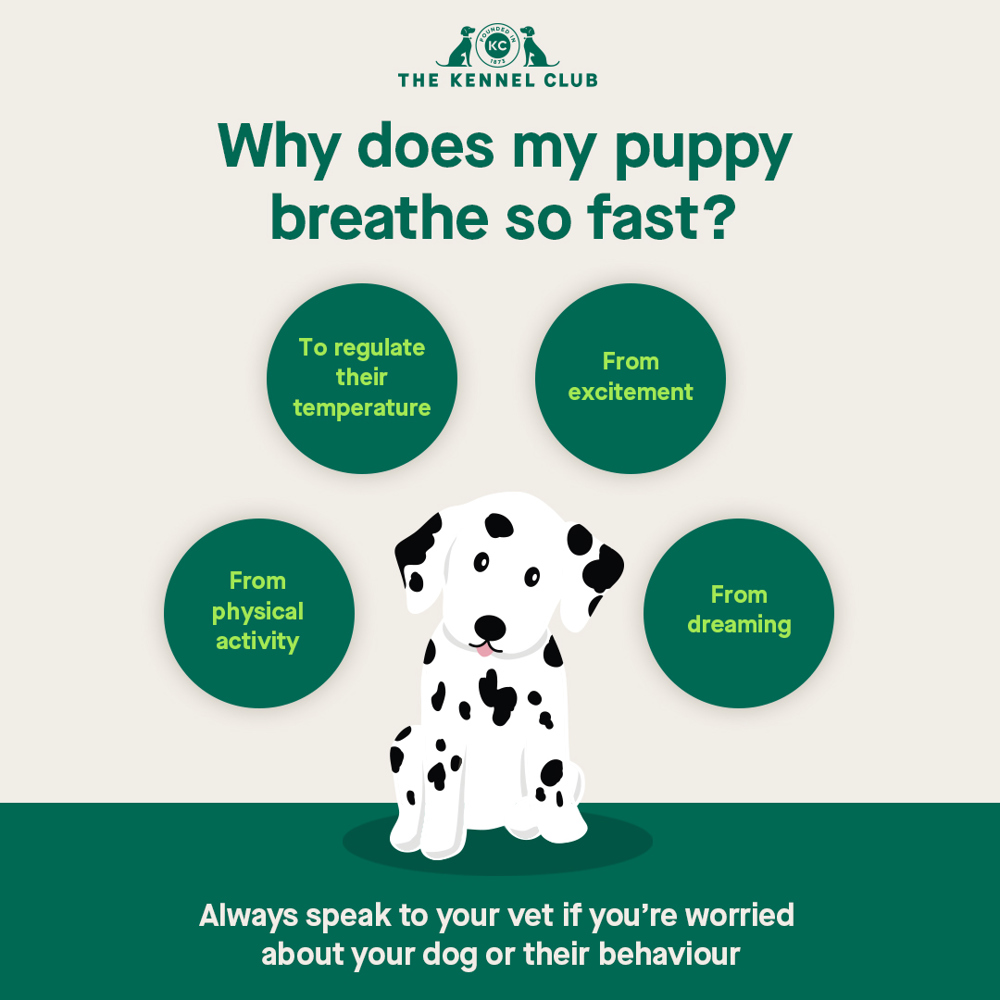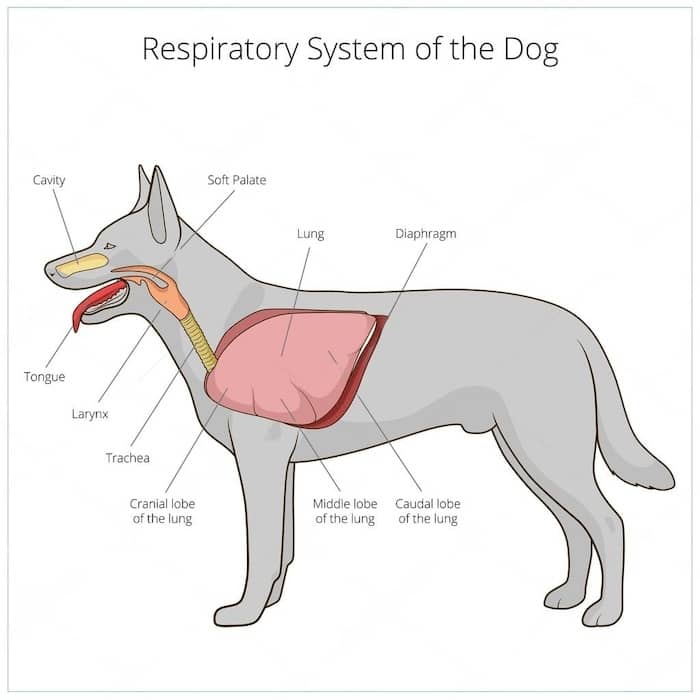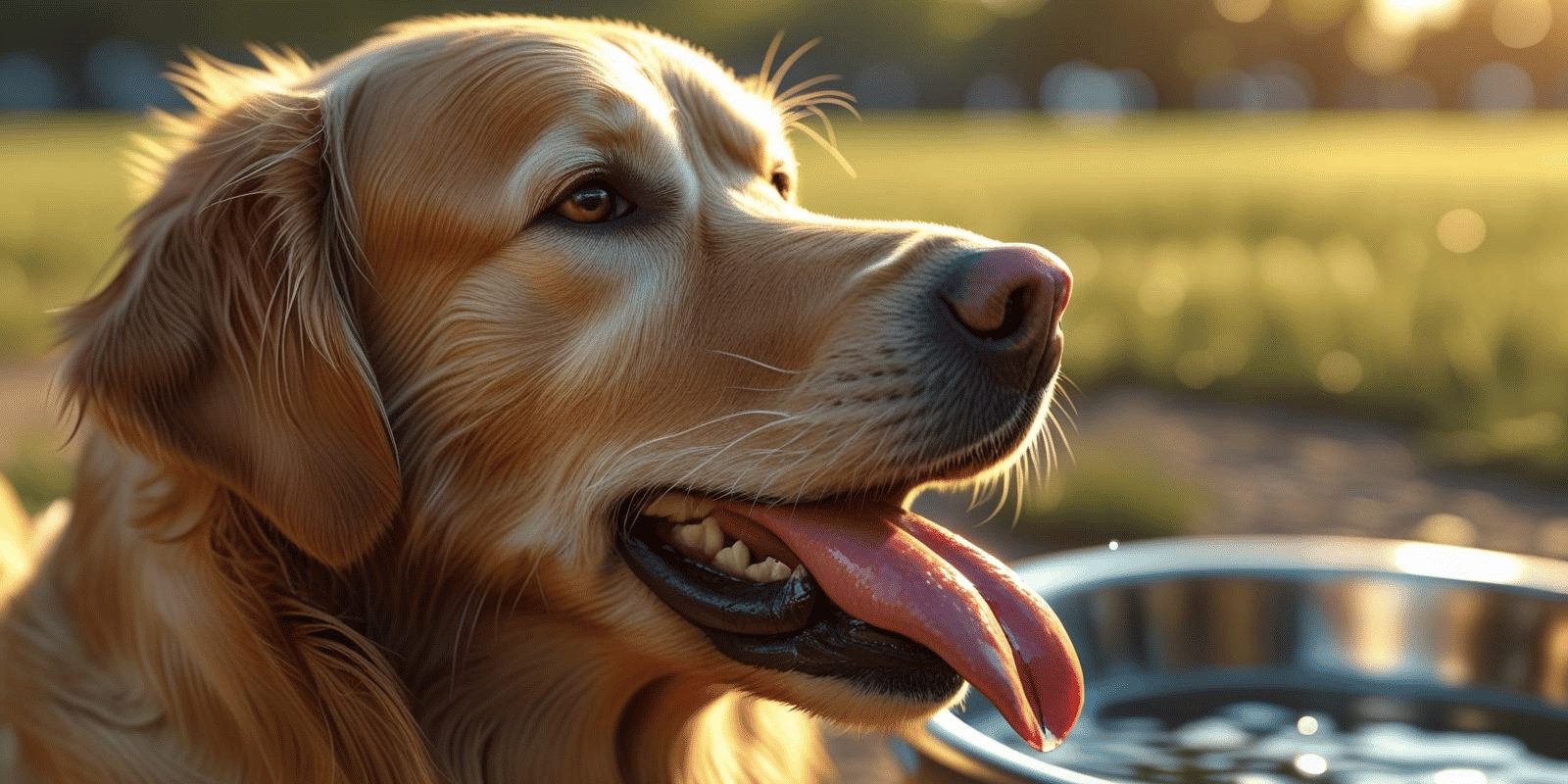Is your dog breathing heavy? This can be concerning for any pet owner.
You might wonder if it’s just normal panting or something more serious. Heavy breathing in dogs can occur for various reasons, ranging from excitement and heat to underlying health issues. Understanding what causes your dog’s heavy breathing is crucial for their well-being.
We’ll explore the common reasons why your dog might be breathing heavily and help you identify when it’s time to take action. You’ll learn how to differentiate between harmless panting and signs that require immediate veterinary attention. Stay with us, as you don’t want to miss this essential information that could make all the difference for your furry friend. Your dog’s health and comfort depend on your awareness and understanding of their needs!
Common Causes Of Heavy Breathing In Dogs
Heavy breathing in dogs can be caused by various factors. Common reasons include heat, stress, or underlying health issues. Recognizing the signs and knowing when to seek help is crucial for your pet’s well-being.
Understanding why your dog is breathing heavily can be crucial for their health. Heavy breathing may be a temporary reaction to excitement or stress, but it can also signal underlying health issues. Identifying the common causes of this condition can help you determine whether your furry friend needs immediate care or simply a moment to relax.
Excitement And Playfulness
Dogs often breathe heavily after an exciting play session. Their hearts race, and the increase in oxygen demand leads to rapid breathing. If your dog has just chased a ball or played with other dogs, heavy breathing is usually normal. Keep an eye on your pup. If the heavy breathing persists long after the playtime has ended, it might indicate something more serious.
Heat And Overexertion
Hot weather can make your dog pant heavily. Dogs do not sweat like humans; they rely on panting to cool down. If you notice your dog breathing heavily after a walk or during a hot day, provide them with fresh water and a cool place to rest. Monitor their behavior closely. If they seem lethargic or disoriented, they might be suffering from heatstroke, which requires immediate attention.
Respiratory Issues
Heavy breathing can also stem from respiratory problems. Conditions like kennel cough, pneumonia, or asthma can make it difficult for your dog to breathe normally. If your dog is coughing or shows signs of distress while breathing, it’s essential to consult your vet. Be aware of other symptoms like nasal discharge or wheezing. These can help your vet diagnose the issue more effectively.
Heart Conditions
Heart problems can lead to heavy breathing as well. Conditions like congestive heart failure can cause fluid buildup in the lungs, making it hard for your dog to breathe. If your dog is also coughing, seems fatigued, or has a reduced appetite, it’s time to seek veterinary help. Consider your dog’s age and breed. Older dogs or breeds prone to heart issues may need more frequent check-ups.
Obesity
Excess weight can make it harder for your dog to breathe easily. Obesity puts strain on the heart and lungs, leading to heavy breathing during normal activities. If you notice your dog is panting heavily during walks or while playing, it might be time to assess their diet and exercise routine. Talk to your vet about a weight management plan. It can make a significant difference in your dog’s health and quality of life. Recognizing the common causes of heavy breathing in dogs is important for their well-being. Always trust your instincts as a pet owner. If something feels off, don’t hesitate to reach out to a veterinarian for guidance. Your dog’s health depends on your attentiveness.
Signs Of Normal Vs. Abnormal Breathing
Understanding the signs of normal versus abnormal breathing in dogs is essential for every dog owner. Heavy breathing can be alarming, but not all heavy breathing is a cause for concern. By recognizing what’s typical for your dog, you can better gauge when it might be time to seek veterinary help.
Normal Breathing Patterns
Most dogs breathe between 10 to 30 breaths per minute when at rest. You can check this by observing your dog while they are calm or asleep. Watch for a gentle rise and fall of their chest, and ensure their breathing looks relaxed.
- Breathing is regular and rhythmic.
- Occasional panting is normal, especially after exercise.
- Temperature and environment can affect breathing rates.
During sleep, dogs may breathe more heavily. This is often due to dreaming or the REM stage of sleep. As a dog owner, it’s important to distinguish between normal sleep breathing and signs of distress.
Signs Of Abnormal Breathing
Abnormal breathing can manifest in various ways. If your dog is panting excessively without any apparent reason, it might be a red flag. Look out for the following signs:
- Rapid breathing (more than 30 breaths per minute while at rest).
- Labored breathing or difficulty in catching their breath.
- Gums that appear blue or pale.
- Coughing or wheezing sounds.
Have you noticed your dog struggling to lay down comfortably? This can also indicate respiratory distress. These symptoms can point to underlying health issues that require immediate attention.
When To Seek Veterinary Help
If you observe any of the abnormal signs mentioned, don’t hesitate to contact your veterinarian. Your dog’s health is paramount, and timely intervention can make a significant difference. Consider the context—was your dog recently active or exposed to extreme heat?
Even if the situation seems minor, trust your instincts. Your dog depends on you to recognize when something isn’t right. If you’re ever in doubt, it’s better to err on the side of caution.
Health Conditions Linked To Heavy Breathing
Heavy breathing in dogs can signal health problems. Understanding these conditions helps pet owners act quickly. Some issues are mild, while others need immediate care.
Heatstroke
Heatstroke occurs when a dog overheats. It can happen during hot weather or after exercise. Dogs may breathe heavily as they try to cool down. Other signs include panting, drooling, and weakness.
Respiratory Infections
Respiratory infections affect a dog’s lungs and airways. They can cause coughing and heavy breathing. Conditions like kennel cough are common. These infections may require veterinary treatment.
Heart Disease
Heart disease can lead to fluid in the lungs. This causes heavy breathing and coughing. Dogs may show fatigue and difficulty exercising. Regular vet check-ups can help detect heart issues early.
Anemia
Anemia means a dog has low red blood cells. This condition can cause weakness and heavy breathing. Anemia may result from various factors, including parasites or chronic diseases. A vet can diagnose and treat anemia effectively.
Allergies
Allergies can affect a dog’s breathing. Pollen, dust, or certain foods may trigger reactions. Heavy breathing can accompany other symptoms like itching or swelling. Identifying and avoiding allergens is crucial.
Asthma
Asthma causes inflammation in a dog’s airways. This can lead to wheezing and heavy breathing. Some dogs may need medication to manage asthma. Owners should watch for signs and consult a vet if needed.
Other Conditions
Many other conditions can cause heavy breathing. These include pneumonia, laryngeal paralysis, and tumors. Each condition varies in severity and treatment. Timely veterinary care is essential for all health issues.

Credit: gsvs.org
When To Seek Immediate Veterinary Care
Heavy breathing in dogs can be alarming. It might indicate a serious health issue. Understanding when to act is crucial. Knowing the signs can help you protect your pet’s health.
Signs Of Respiratory Distress
Look for signs that indicate your dog is in trouble. Rapid breathing or panting is common. But watch for other symptoms too. Gums that appear blue or pale are concerning. Dogs that collapse or seem weak need help fast.
Excessive Drooling Or Coughing
Drooling can signal distress. Excessive drooling often accompanies heavy breathing. Coughing may also indicate a problem. If your dog coughs frequently, do not wait. Contact your vet right away.
Difficulty Lying Down
Dogs should be able to lie down comfortably. If your dog cannot find a comfortable position, act quickly. This can be a sign of serious trouble. Your dog may feel pain or have difficulty breathing.
Neck Extended While Breathing
A dog struggling to breathe may extend its neck. This position shows discomfort. It indicates the dog is trying to get more air. Immediate veterinary attention is necessary in this case.
History Of Heart Or Respiratory Issues
If your dog has a history of heart problems, seek help. Past conditions can worsen over time. Be proactive about changes in breathing. Always consult your vet for any new symptoms.
Environmental Factors Affecting Breathing
Many factors in the environment can impact a dog’s breathing. Understanding these factors is essential for dog owners. Some may cause heavy breathing, while others might not. Being aware helps you act quickly when needed.
Temperature And Humidity
Hot and humid weather can strain a dog’s breathing. Dogs do not sweat like humans. They rely on panting to cool down. High temperatures can lead to heat exhaustion. Always provide fresh water and shade during hot days.
Allergens And Pollutants
Allergens can trigger respiratory issues in dogs. Pollen, dust, and smoke affect their airways. Dogs may sneeze, cough, or breathe heavily. Keeping your home clean can reduce exposure. Avoid smoking near your dog to protect their lungs.
Altitude Changes
High altitudes lower oxygen levels. Some dogs may struggle to breathe at these heights. Breeds like Bulldogs and Pugs are more affected. Monitor your dog closely during altitude changes. Give them time to adjust to new environments.
Exercise And Activity Level
Intense exercise can lead to heavy breathing. Dogs often pant after running or playing. This is normal and usually temporary. Always allow them time to rest. Keep exercise moderate during hot weather.
Indoor Air Quality
Poor indoor air quality can harm your dog’s health. Dust, mold, and chemicals can irritate their lungs. Use air purifiers to improve air quality. Regular cleaning helps keep allergens at bay.

Credit: www.thekennelclub.org.uk
How Stress And Anxiety Impact Breathing
Understanding how stress and anxiety affect your dog’s breathing can be crucial for their overall well-being. When dogs experience stress or anxiety, their body reacts in various ways, including changes in their breathing patterns. Recognizing these signs can help you address the root cause and provide the support your furry friend needs.
Physical Reactions To Stress
Stress triggers the release of adrenaline in dogs, leading to faster heart rates and heavier breathing. You might notice your dog panting when they encounter a stressful situation, such as a loud noise or a new environment. This physical response can be alarming, especially if it seems out of the ordinary.
Consider the time when your dog encountered a thunderstorm. The heavy rain and booming thunder caused them to pant heavily and seek comfort. This reaction is common, and it’s your dog’s way of coping with anxiety.
Signs Of Anxiety In Dogs
Anxiety manifests in various ways beyond heavy breathing. Look for signs like excessive barking, pacing, or hiding. These behaviors often accompany heavy breathing and indicate that your dog is feeling overwhelmed.
- Panting
- Restlessness
- Destructive behavior
Have you noticed any of these signs during stressful situations? If so, your dog may need some additional support.
Calming Techniques
Implementing calming techniques can significantly improve your dog’s breathing during stressful times. Creating a safe space where they can retreat is essential. Use soft bedding and familiar toys to help them feel secure.
Consider practicing deep breathing exercises yourself. By remaining calm, you can help your dog relax as they often pick up on your emotions. Simple actions like gentle petting or playing soothing music can also work wonders.
When To Seek Help
While some heavy breathing is normal during stressful moments, persistent heavy breathing can be concerning. If your dog’s breathing doesn’t return to normal after the stressor is removed, it’s time to consult your vet. They can help determine whether anxiety is the sole cause or if an underlying health issue is at play.
Is your dog showing signs of prolonged anxiety or stress? It’s important to address these issues quickly to maintain their health.
Steps To Calm A Dog Breathing Heavily
Seeing your dog breathe heavily can be worrying. It’s important to act quickly. Here are some simple steps to help calm your dog. These methods can reduce stress and improve their breathing.
Provide Fresh Air
Start by moving your dog to a cooler area. Open windows or take them outside. Fresh air helps lower their breathing rate. Ensure the space is quiet and calm.
Keep Them Calm
Excitement can make breathing worse. Limit your dog’s movement. Speak softly and gently to them. A calm tone can help ease their anxiety.
Hydrate Your Dog
Offer your dog some water. Dehydration can contribute to heavy breathing. Ensure they drink slowly to avoid choking.
Use A Cool Cloth
A cool, damp cloth can help. Gently wipe your dog’s paws and face. This can lower their body temperature and ease discomfort.
Monitor Their Breathing
Keep an eye on your dog’s breathing rate. Count how many breaths they take in one minute. If it stays high, it may be time to see a vet.
Contact A Veterinarian
If heavy breathing continues, call your veterinarian. Describe your dog’s symptoms clearly. Follow their advice for the best care.
Preventing Heavy Breathing Episodes
Heavy breathing in dogs can signal various health issues. Understanding the causes is important for pet owners. Look for signs that require immediate attention, like blue gums or excessive drooling. Knowing when to worry can help keep your dog safe and healthy.
When your dog experiences heavy breathing, it can be concerning. Preventing heavy breathing episodes is crucial for your pet’s overall health and well-being. A proactive approach can make a significant difference. Here are some effective strategies you can implement to help keep your furry friend comfortable and breathing normally.
Maintain A Healthy Weight
Excess weight can put a strain on your dog’s respiratory system. Keeping your dog at a healthy weight reduces the risk of breathing issues. – Regular Exercise: Engage your dog in daily walks or play sessions. Aim for at least 30 minutes of activity each day. – Balanced Diet: Feed your dog high-quality food suited to their age and breed. Monitor portion sizes to avoid overeating.
Create A Comfortable Environment
Your dog’s surroundings can significantly affect their breathing. A comfortable environment can help reduce stress and anxiety. – Temperature Control: Keep your home at a comfortable temperature. Hot weather can lead to heavy breathing, so ensure your dog has access to cool areas. – Air Quality: Use air purifiers and keep windows open for fresh air. Avoid exposure to smoke or strong odors.
Regular Veterinary Check-ups
Routine vet visits are essential for early detection of potential health issues. Regular check-ups can help prevent respiratory problems. – Vaccinations: Ensure your dog receives all necessary vaccinations. This protects against respiratory infections. – Health Monitoring: Observe any changes in your dog’s behavior or breathing patterns. Early intervention can make a significant difference.
Manage Stress And Anxiety
Stress can lead to heavy breathing in dogs. Creating a calm atmosphere can help your dog relax. – Safe Space: Provide a quiet area where your dog can retreat when feeling anxious. – Calming Techniques: Consider using anxiety wraps or calming music to soothe your dog during stressful situations. Have you noticed any specific triggers that cause your dog to breathe heavily? Identifying these can help you take preventative measures tailored to your dog’s needs. Taking these steps can lead to a happier, healthier dog with fewer heavy breathing episodes.
Diagnosing Breathing Issues In Dogs
Understanding breathing issues in dogs is crucial for pet owners. Heavy breathing can signal various health problems. Recognizing the signs helps in seeking timely care. Early diagnosis can make a significant difference.
Veterinarians consider several factors when diagnosing breathing issues. Observing the dog’s behavior is essential. Owners should note any changes in breathing patterns.
Common Symptoms Of Breathing Problems
Look for signs like coughing or wheezing. Excessive panting can also indicate distress. Pay attention to nasal discharge or unusual noises. These symptoms may suggest respiratory issues.
Physical Examination By A Veterinarian
A veterinarian will perform a thorough physical exam. They will listen to the dog’s heart and lungs. This helps identify any abnormalities. Tests may include X-rays or ultrasounds for a detailed view.
Diagnostic Tests
Blood tests can reveal underlying conditions. These may include infections or anemia. A bronchoscopy might be necessary for further investigation. This procedure allows the vet to look inside the airways.
Monitoring The Dog’s Environment
Changes in the dog’s environment can affect breathing. Allergens or pollutants may trigger respiratory issues. Keep the living space clean and free of irritants. Observe for any patterns that worsen breathing.
When To Seek Immediate Help
Seek immediate veterinary care for severe symptoms. Signs like blue or pale gums need urgent attention. Difficulty breathing or collapse is also a red flag. Don’t hesitate to contact your vet in these situations.
Available Treatments And Long-term Care
Understanding the available treatments and long-term care for your dog experiencing heavy breathing is essential for ensuring their health and well-being. Whether it’s a temporary issue or a sign of a more serious condition, knowing how to respond can make a significant difference. Below, we will explore various treatment options and long-term care strategies that can help your furry friend breathe easier.
Treatment Options
Identifying the underlying cause of heavy breathing is crucial. Treatments can vary widely based on the diagnosis. Here are some common approaches:
- Medication:Depending on the condition, your vet might prescribe anti-inflammatory drugs, bronchodilators, or antibiotics.
- Oxygen Therapy:For dogs with severe breathing difficulties, supplemental oxygen can help them breathe more comfortably.
- Surgery:In cases like laryngeal paralysis, surgical intervention may be necessary to improve airflow.
Always consult your veterinarian for personalized treatment options. They will assess your dog’s specific needs and recommend the best course of action.
Monitoring And Long-term Care
Once your dog is on the path to recovery, ongoing care is vital. Regular vet check-ups can help you stay ahead of any potential issues. Here are some important considerations:
- Weight Management:Keeping your dog at a healthy weight can reduce strain on their respiratory system.
- Environmental Control:Ensure your home is free from smoke, dust, and allergens that can exacerbate breathing problems.
- Exercise:Regular, moderate exercise helps maintain lung function, but avoid strenuous activities that could cause distress.
Have you noticed any changes in your dog’s breathing patterns during different activities? Observing these changes can provide valuable insights to your vet.
Signs To Watch For
Even with treatment, it’s crucial to remain vigilant. Watch for signs that indicate your dog may need immediate veterinary attention:
- Rapid or labored breathing
- Blue or pale gums
- Excessive drooling
- Inability to lie down comfortably
Have you ever felt a sense of panic seeing your dog struggle to breathe? It’s a heart-wrenching experience that calls for quick action.
Incorporating these treatment options and long-term care strategies can help you manage your dog’s heavy breathing effectively. Keeping open communication with your veterinarian ensures that your furry friend receives the best care possible.

Credit: www.kingsdale.com
Frequently Asked Questions
When To Be Concerned About Heavy Breathing In Dogs?
Be concerned about heavy breathing in dogs if it occurs with blue or pale gums, excessive drooling, or collapse. Difficulty lying down comfortably and extending the neck while breathing also indicate a need for urgent veterinary care. Always consult a vet if heavy breathing persists.
How To Calm A Dog That’s Breathing Heavy?
To calm a dog breathing heavily, provide fresh air by moving them to a well-ventilated area. Keep the environment calm and limit their movement to reduce excitement. If heavy breathing persists, contact a veterinarian for professional advice.
Is It Normal For Dogs To Breathe Heavily While Lying Down?
Yes, it can be normal for dogs to breathe heavily while lying down, especially during sleep. Rapid breathing may occur during the REM stage when dogs dream. However, if heavy breathing is excessive or accompanied by other symptoms, consult a veterinarian for evaluation.
Why Is My Dog Breathing Heavily?
Heavy breathing in dogs can be due to many reasons, including excitement, heat, or health issues.
Is Heavy Breathing Normal For Dogs?
Sometimes, heavy breathing is normal, especially after exercise or during sleep.
What Causes Rapid Breathing In Dogs?
Rapid breathing can be caused by anxiety, pain, heat, or respiratory problems.
Should I Worry About My Dog’s Heavy Breathing?
Worry if heavy breathing lasts long or is paired with other symptoms.
How Can I Calm A Dog Breathing Heavily?
Calm your dog by creating a quiet space and reducing excitement.
When Should I Take My Dog To The Vet?
Visit the vet if heavy breathing continues or if your dog has blue gums.
Can Heat Make My Dog Breathe Heavily?
Yes, dogs can breathe heavily if they are too hot or overheated.
Conclusion
Heavy breathing in dogs can signal various issues. Understanding the reasons helps you respond better. Always observe your dog closely. If breathing seems unusual, check for other signs. Seek veterinary help if needed. Your dog’s health is important. Quick action can make a difference.
Keep your furry friend comfortable and safe. Stay informed and proactive about their well-being.

